Zelai Xu
WideSeek-R1: Exploring Width Scaling for Broad Information Seeking via Multi-Agent Reinforcement Learning
Feb 04, 2026Abstract:Recent advancements in Large Language Models (LLMs) have largely focused on depth scaling, where a single agent solves long-horizon problems with multi-turn reasoning and tool use. However, as tasks grow broader, the key bottleneck shifts from individual competence to organizational capability. In this work, we explore a complementary dimension of width scaling with multi-agent systems to address broad information seeking. Existing multi-agent systems often rely on hand-crafted workflows and turn-taking interactions that fail to parallelize work effectively. To bridge this gap, we propose WideSeek-R1, a lead-agent-subagent framework trained via multi-agent reinforcement learning (MARL) to synergize scalable orchestration and parallel execution. By utilizing a shared LLM with isolated contexts and specialized tools, WideSeek-R1 jointly optimizes the lead agent and parallel subagents on a curated dataset of 20k broad information-seeking tasks. Extensive experiments show that WideSeek-R1-4B achieves an item F1 score of 40.0% on the WideSearch benchmark, which is comparable to the performance of single-agent DeepSeek-R1-671B. Furthermore, WideSeek-R1-4B exhibits consistent performance gains as the number of parallel subagents increases, highlighting the effectiveness of width scaling.
Kimi K2.5: Visual Agentic Intelligence
Feb 02, 2026Abstract:We introduce Kimi K2.5, an open-source multimodal agentic model designed to advance general agentic intelligence. K2.5 emphasizes the joint optimization of text and vision so that two modalities enhance each other. This includes a series of techniques such as joint text-vision pre-training, zero-vision SFT, and joint text-vision reinforcement learning. Building on this multimodal foundation, K2.5 introduces Agent Swarm, a self-directed parallel agent orchestration framework that dynamically decomposes complex tasks into heterogeneous sub-problems and executes them concurrently. Extensive evaluations show that Kimi K2.5 achieves state-of-the-art results across various domains including coding, vision, reasoning, and agentic tasks. Agent Swarm also reduces latency by up to $4.5\times$ over single-agent baselines. We release the post-trained Kimi K2.5 model checkpoint to facilitate future research and real-world applications of agentic intelligence.
Mastering Multi-Drone Volleyball through Hierarchical Co-Self-Play Reinforcement Learning
May 07, 2025Abstract:In this paper, we tackle the problem of learning to play 3v3 multi-drone volleyball, a new embodied competitive task that requires both high-level strategic coordination and low-level agile control. The task is turn-based, multi-agent, and physically grounded, posing significant challenges due to its long-horizon dependencies, tight inter-agent coupling, and the underactuated dynamics of quadrotors. To address this, we propose Hierarchical Co-Self-Play (HCSP), a hierarchical reinforcement learning framework that separates centralized high-level strategic decision-making from decentralized low-level motion control. We design a three-stage population-based training pipeline to enable both strategy and skill to emerge from scratch without expert demonstrations: (I) training diverse low-level skills, (II) learning high-level strategy via self-play with fixed low-level controllers, and (III) joint fine-tuning through co-self-play. Experiments show that HCSP achieves superior performance, outperforming non-hierarchical self-play and rule-based hierarchical baselines with an average 82.9\% win rate and a 71.5\% win rate against the two-stage variant. Moreover, co-self-play leads to emergent team behaviors such as role switching and coordinated formations, demonstrating the effectiveness of our hierarchical design and training scheme.
AED: Automatic Discovery of Effective and Diverse Vulnerabilities for Autonomous Driving Policy with Large Language Models
Mar 24, 2025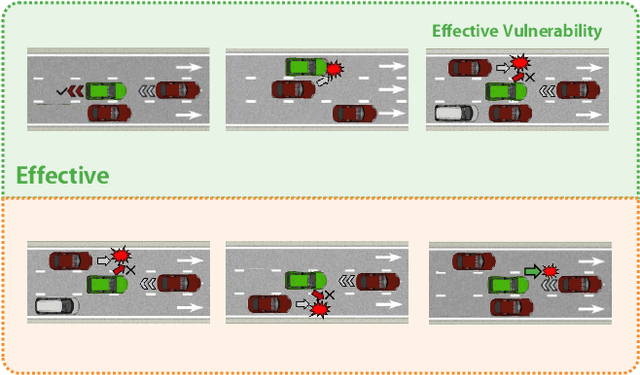



Abstract:Assessing the safety of autonomous driving policy is of great importance, and reinforcement learning (RL) has emerged as a powerful method for discovering critical vulnerabilities in driving policies. However, existing RL-based approaches often struggle to identify vulnerabilities that are both effective-meaning the autonomous vehicle is genuinely responsible for the accidents-and diverse-meaning they span various failure types. To address these challenges, we propose AED, a framework that uses large language models (LLMs) to automatically discover effective and diverse vulnerabilities in autonomous driving policies. We first utilize an LLM to automatically design reward functions for RL training. Then we let the LLM consider a diverse set of accident types and train adversarial policies for different accident types in parallel. Finally, we use preference-based learning to filter ineffective accidents and enhance the effectiveness of each vulnerability. Experiments across multiple simulated traffic scenarios and tested policies show that AED uncovers a broader range of vulnerabilities and achieves higher attack success rates compared with expert-designed rewards, thereby reducing the need for manual reward engineering and improving the diversity and effectiveness of vulnerability discovery.
Learning Strategic Language Agents in the Werewolf Game with Iterative Latent Space Policy Optimization
Feb 07, 2025



Abstract:Large language model (LLM)-based agents have recently shown impressive progress in a variety of domains, including open-ended conversation and multi-step decision-making. However, applying these agents to social deduction games such as Werewolf, which requires both strategic decision-making and free-form language interaction, remains non-trivial. Traditional methods based on Counterfactual Regret Minimization (CFR) or reinforcement learning (RL) typically depend on a predefined action space, making them unsuitable for language games with unconstrained text action space. Meanwhile, pure LLM-based agents often suffer from intrinsic biases and require prohibitively large datasets for fine-tuning. We propose Latent Space Policy Optimization (LSPO), an iterative framework that addresses these challenges by first mapping free-form text to a discrete latent space, where methods like CFR and RL can learn strategic policy more effectively. We then translate the learned policy back into natural language dialogues, which are used to fine-tune an LLM via Direct Preference Optimization (DPO). By iteratively alternating between these stages, our LSPO agent progressively enhances both strategic reasoning and language communication. Experiment results on the Werewolf game show that our method improves the agent's performance in each iteration and outperforms existing Werewolf agents, underscoring its promise for free-form language decision-making.
VolleyBots: A Testbed for Multi-Drone Volleyball Game Combining Motion Control and Strategic Play
Feb 04, 2025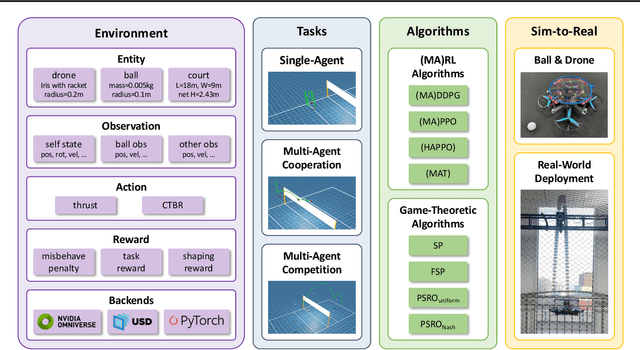
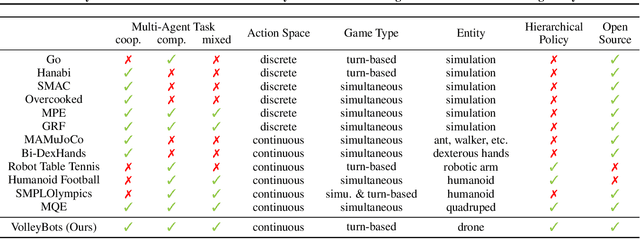
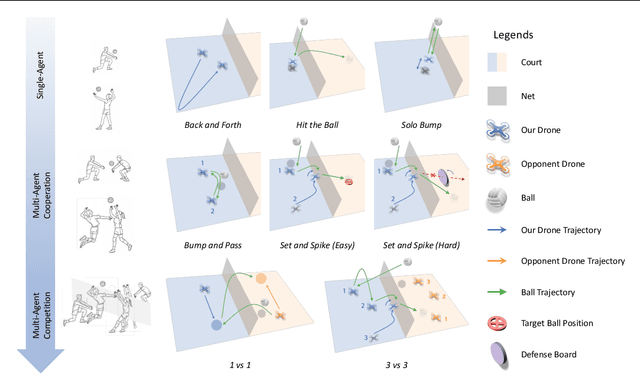

Abstract:Multi-agent reinforcement learning (MARL) has made significant progress, largely fueled by the development of specialized testbeds that enable systematic evaluation of algorithms in controlled yet challenging scenarios. However, existing testbeds often focus on purely virtual simulations or limited robot morphologies such as robotic arms, quadrupeds, and humanoids, leaving high-mobility platforms with real-world physical constraints like drones underexplored. To bridge this gap, we present VolleyBots, a new MARL testbed where multiple drones cooperate and compete in the sport of volleyball under physical dynamics. VolleyBots features a turn-based interaction model under volleyball rules, a hierarchical decision-making process that combines motion control and strategic play, and a high-fidelity simulation for seamless sim-to-real transfer. We provide a comprehensive suite of tasks ranging from single-drone drills to multi-drone cooperative and competitive tasks, accompanied by baseline evaluations of representative MARL and game-theoretic algorithms. Results in simulation show that while existing algorithms handle simple tasks effectively, they encounter difficulty in complex tasks that require both low-level control and high-level strategy. We further demonstrate zero-shot deployment of a simulation-learned policy to real-world drones, highlighting VolleyBots' potential to propel MARL research involving agile robotic platforms. The project page is at https://sites.google.com/view/volleybots/home.
A Survey on Self-play Methods in Reinforcement Learning
Aug 02, 2024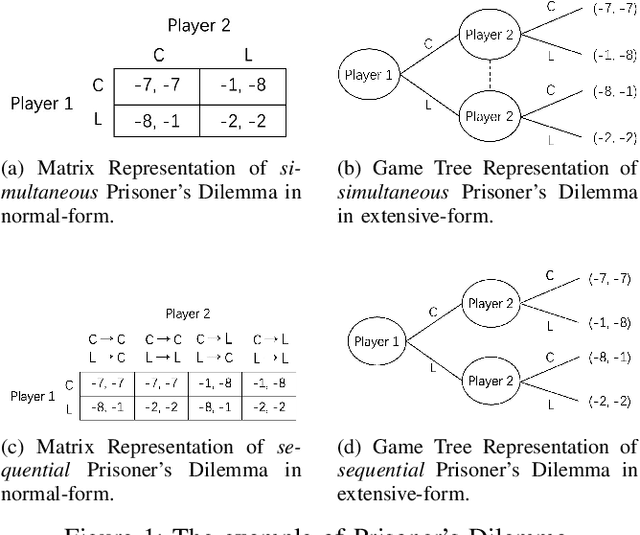
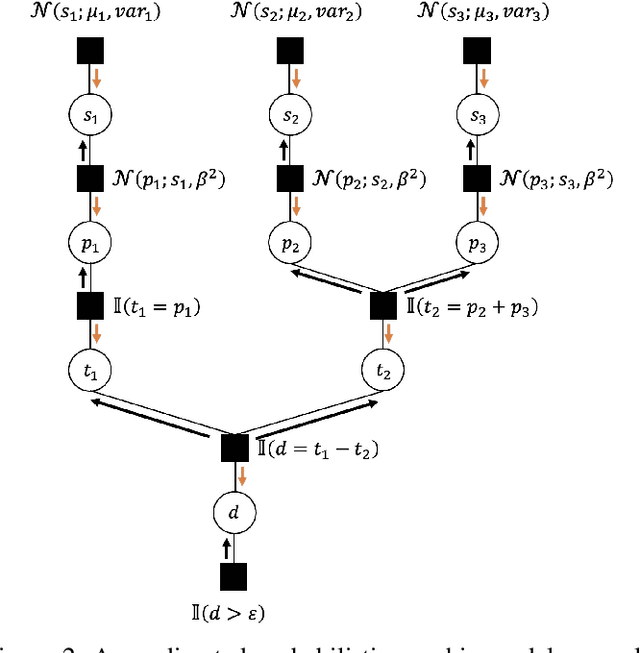
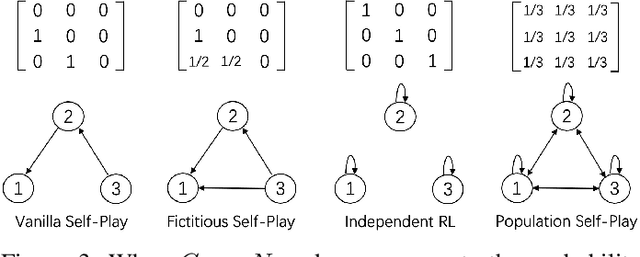
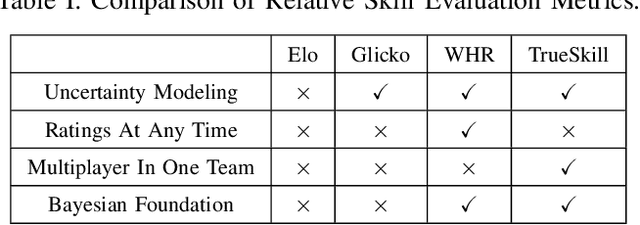
Abstract:Self-play, characterized by agents' interactions with copies or past versions of itself, has recently gained prominence in reinforcement learning. This paper first clarifies the preliminaries of self-play, including the multi-agent reinforcement learning framework and basic game theory concepts. Then it provides a unified framework and classifies existing self-play algorithms within this framework. Moreover, the paper bridges the gap between the algorithms and their practical implications by illustrating the role of self-play in different scenarios. Finally, the survey highlights open challenges and future research directions in self-play. This paper is an essential guide map for understanding the multifaceted landscape of self-play in RL.
Language Agents with Reinforcement Learning for Strategic Play in the Werewolf Game
Oct 29, 2023



Abstract:Agents built with large language models (LLMs) have recently achieved great advancements. However, most of the efforts focus on single-agent or cooperative settings, leaving more general multi-agent environments underexplored. We propose a new framework powered by reinforcement learning (RL) to develop strategic language agents, i.e., LLM-based agents with strategic thinking ability, for a popular language game, Werewolf. Werewolf is a social deduction game with hidden roles that involves both cooperation and competition and emphasizes deceptive communication and diverse gameplay. Our agent tackles this game by first using LLMs to reason about potential deceptions and generate a set of strategically diverse actions. Then an RL policy, which selects an action from the candidates, is learned by population-based training to enhance the agents' decision-making ability. By combining LLMs with the RL policy, our agent produces a variety of emergent strategies, achieves the highest win rate against other LLM-based agents, and stays robust against adversarial human players in the Werewolf game.
Accelerate Multi-Agent Reinforcement Learning in Zero-Sum Games with Subgame Curriculum Learning
Oct 07, 2023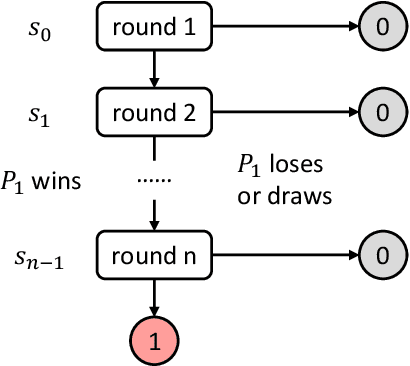

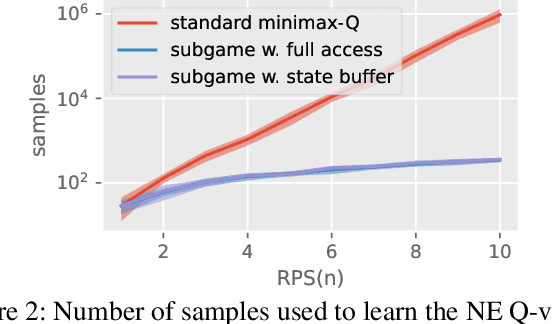
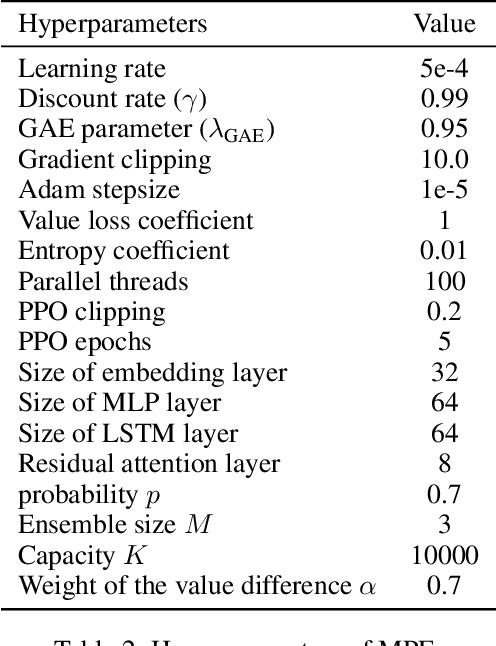
Abstract:Learning Nash equilibrium (NE) in complex zero-sum games with multi-agent reinforcement learning (MARL) can be extremely computationally expensive. Curriculum learning is an effective way to accelerate learning, but an under-explored dimension for generating a curriculum is the difficulty-to-learn of the subgames -- games induced by starting from a specific state. In this work, we present a novel subgame curriculum learning framework for zero-sum games. It adopts an adaptive initial state distribution by resetting agents to some previously visited states where they can quickly learn to improve performance. Building upon this framework, we derive a subgame selection metric that approximates the squared distance to NE values and further adopt a particle-based state sampler for subgame generation. Integrating these techniques leads to our new algorithm, Subgame Automatic Curriculum Learning (SACL), which is a realization of the subgame curriculum learning framework. SACL can be combined with any MARL algorithm such as MAPPO. Experiments in the particle-world environment and Google Research Football environment show SACL produces much stronger policies than baselines. In the challenging hide-and-seek quadrant environment, SACL produces all four emergent stages and uses only half the samples of MAPPO with self-play. The project website is at https://sites.google.com/view/sacl-rl.
Fictitious Cross-Play: Learning Global Nash Equilibrium in Mixed Cooperative-Competitive Games
Oct 05, 2023Abstract:Self-play (SP) is a popular multi-agent reinforcement learning (MARL) framework for solving competitive games, where each agent optimizes policy by treating others as part of the environment. Despite the empirical successes, the theoretical properties of SP-based methods are limited to two-player zero-sum games. However, for mixed cooperative-competitive games where agents on the same team need to cooperate with each other, we can show a simple counter-example where SP-based methods cannot converge to a global Nash equilibrium (NE) with high probability. Alternatively, Policy-Space Response Oracles (PSRO) is an iterative framework for learning NE, where the best responses w.r.t. previous policies are learned in each iteration. PSRO can be directly extended to mixed cooperative-competitive settings by jointly learning team best responses with all convergence properties unchanged. However, PSRO requires repeatedly training joint policies from scratch till convergence, which makes it hard to scale to complex games. In this work, we develop a novel algorithm, Fictitious Cross-Play (FXP), which inherits the benefits from both frameworks. FXP simultaneously trains an SP-based main policy and a counter population of best response policies. The main policy is trained by fictitious self-play and cross-play against the counter population, while the counter policies are trained as the best responses to the main policy's past versions. We validate our method in matrix games and show that FXP converges to global NEs while SP methods fail. We also conduct experiments in a gridworld domain, where FXP achieves higher Elo ratings and lower exploitabilities than baselines, and a more challenging football game, where FXP defeats SOTA models with over 94% win rate.
 Add to Chrome
Add to Chrome Add to Firefox
Add to Firefox Add to Edge
Add to Edge